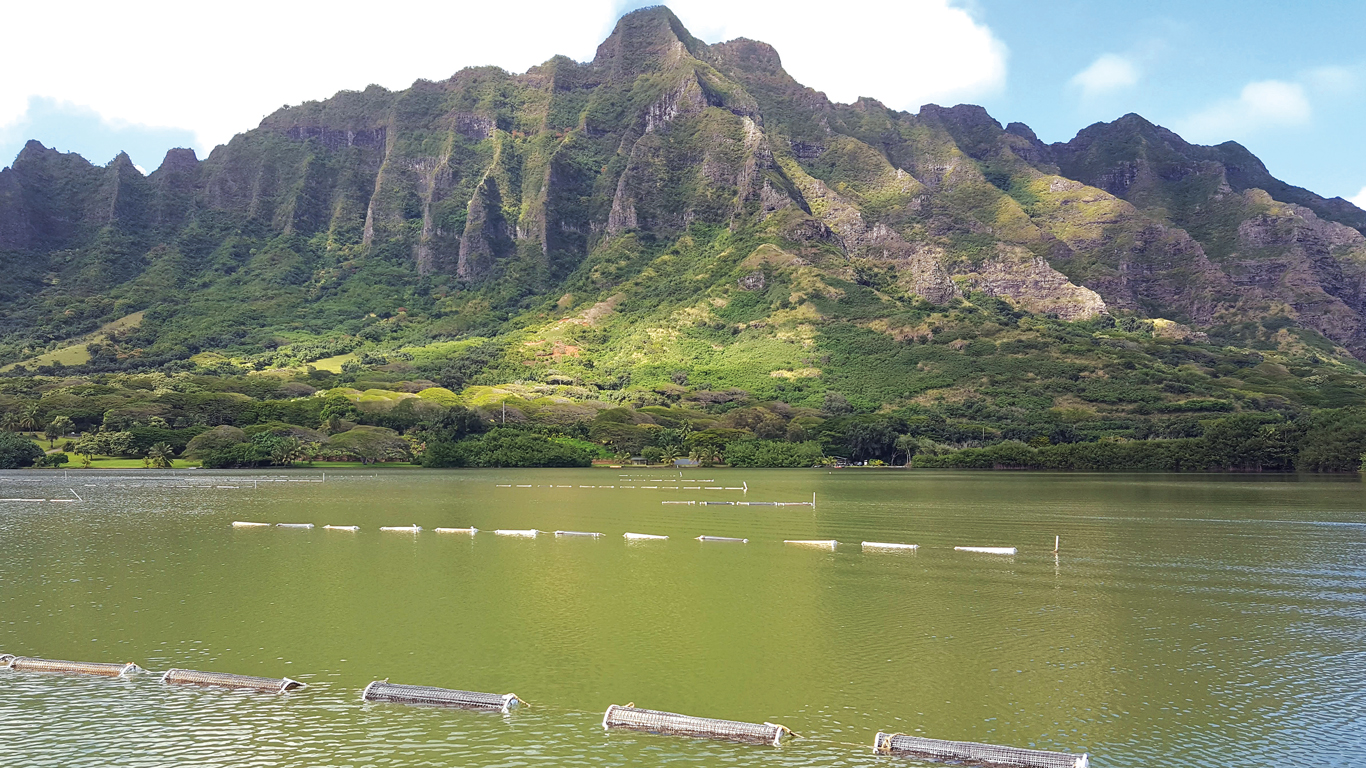PERMITS AND REGULATORY REQUIREMENTS FOR AQUACULTURE IN HAWAIʻI
The content of these webpages was prepared as a report for the Aquaculture and Livestock Support Services Program, Department of Agriculture by Aquaculture Planning & Advocacy, LLC, September 1, 2011.


Introduction
Hawaiʻi has a long history of encouraging and supporting commercial aquaculture development that continues today. The state wants to use this food production technology to expand and diversify the economies on all islands and enhance overall island food self-sufficiency. The Islands have the longest tradition of aquaculture in the United States, as evidenced by the many remarkable remnants of the coastal, stone-walled fish ponds constructed by early Hawaiians over 800 years ago.
Industry proponents have steadily built on Hawaiʻi’s supportive aquaculture policy and tradition, today farming over 30 species of aquatic plants and animals, while utilizing both land and ocean sites and the latest technologies. Essential for this growth in an island setting has been a regulatory framework and permitting process that leads to selection of the most appropriate site through a balanced and transparent review of the project by the responsible agencies and the interested public. The Department of Agriculture (DOA) is providing this updated guide to Permits and Environmental Requirements for Aquaculture in Hawaiʻi to assist companies in understanding the current regulatory process.
This guide reviews the current federal, state and county permits and major requirements to site, build and operate an aquaculture business in the state. The review endeavors to incorporate the most current information available. However, the user is cautioned that the regulatory environment is constantly changing due to changes in law and rules, as well as, decisions handed down by the courts. Prospective projects should work closely with the responsible permit agencies during all phases of planning and development to have a clear understanding of the permit process and the information required.
The Permits and Regulatory Requirements for Aquaculture in Hawaiʻi Guidebook was prepared by John S. Corbin, Aquaculture Planning and Advocacy LLC, for the Aquaculture and Livestock Support Services (ALSS) program, Hawaiʻi Department of Agriculture. ALSS and the author gratefully acknowledge the value of a previous permits report, published in 1995, and prepared by John H. Bay for the Aquaculture Development Program, Hawaiʻi Department of Land and Natural Resources. Further, the author wishes to thank the permitting agencies who assisted in the preparation of this document.
This guide is designed to help prospective aquaculture projects have a better understanding of the Hawaiʻi permitting process, and is not a legal document. Further, the guide book should not be relied on exclusively to determine a project’s legal and permitting responsibilities. Some permits and licenses not included in this guide may be necessary to site, build, and operate a particular project.
The Department of Agriculture (DOA) and the State of Hawaiʻi are not responsible for delays or losses caused by the permit processing and approval experience should it differ from that written in this guide book. Additionally, this guidebook is not meant to be a substitute for hiring professional permitting assistance should the scope and complexity of any specific project warrant it.
The DOA recommends that each aquaculture project carefully assess the need to hire a professional consultant familiar with these federal, state and county permits to assist in the process. Further, the DOA also strongly recommends contacting the relevant permitting agencies early in the project planning process to begin discussions of the information requirements for the proposed site, production technology and species chosen.
The Hawai’i Department of Agriculture does not discriminate on the basis of race, color, sex, national origin, age, or disability, or any other class as protected under applicable federal or state law, in administration of its programs, or activities, and, the Hawaiʻi Department of Agriculture does not intimidate or retaliate against any individual or group because they have exercised their rights to participate in actions protected, or oppose action prohibited, by 40 C.F.R. Parts 5 and 7, or for the purpose of interfering with such rights.
The HDOA Non-Discrimination Coordinator is responsible for coordination or compliance efforts and receipt of inquiries concerning non-discrimination requirements implemented by 40 C.F.R. Parts 5 and 7 (Non-Discrimination in Programs or Activities Receiving Federal Financial Assistance from the Environmental Protection Agency), including Title VI of the Civil Rights Act of 1964, as amended; Section 504 of the Rehabilitation Act of 1973; the Age Discrimination Act of 1975; Title IX of the Education Amendments of 1972; and Section 13 of the Federal Water Pollution Control Act Amendments of 1972 (hereinafter collectively referred to as the federal non-discrimination laws).
If you have any questions about this notice or any of HDOA’s Non-Discrimination Programs, policies, or procedures, you may contact:
Rae Gee, Non-Discrimination Coordinator
Hawaiʻi Department of Agriculture
1428 South King Street, Honolulu, Hawaiʻi 96814
Phone: (808) 973-9560
Email: Hdoa.titlevi@hawaii.gov
If you believe you have been discriminated against with respect to a Hawaiʻi Department of Agriculture program or activity receiving federal financial assistance, please contact the HDOA Non-Discrimination Coordinator identified above or visit our website http://hoda.Hawaii.gov/blog/
The Hawaiʻi Department of Agriculture does not intimidate, threaten, coerce, or discriminate against any individual group for the purpose of interfering with any right or privilege guaranteed under federal anti-discrimination laws, or because of an individual has filed a complaint or has testified, assisted, or participated in any way in an investigation, proceeding, or hearing related to federal anti-discrimination laws, or has opposed any practice made unlawfully by federal anti-discrimination laws.
To request translation, interpretation, modifications, accommodations, or other auxiliary aids or services, contact the HDOA Office of the Chairperson, (808) 973-9560 or email hdoa.info@hawaii.gov. Please allow sufficient time for HDOA to meet accommodation requests


Department of Agriculture – Aquaculture and Livestock Services
99-941 Halawa Valley Street
Aiea, Hawaii 96701-5602
Phone: 808-483-7130
Fax: 808-483-7110
E-mail: hdoa.alss@hawaii.gov
Web site: http://hawaii.gov/hdoa/adp
Pacific Region Aquaculture and Coastal Resource Hub
2525 Correa Road, HIG 238
Honolulu, HI 96822
Phone: (808) 956-7031

Each pattern represents a Center of Excellence. Learn more about the cultural connections and meanings behind them.


